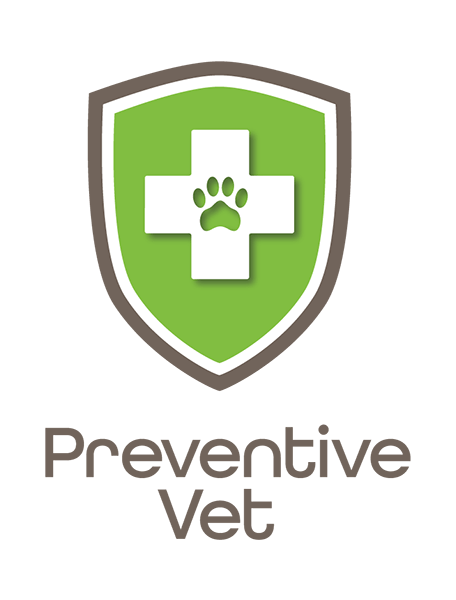- en
Pet InfoRx®
Pancreatitis in Dogs
Your dog has started vomiting and doesn’t have much of an appetite. The veterinarian has diagnosed your dog with pancreatitis. That might sound a bit scary and you are wondering why it happened.
This InfoRx will explain what pancreatitis is, what causes is it, and how to prevent it from happening again.
Quick Links
A Dog's Pancreas

In Greek, the word Pancreas means “all flesh.” The first person to formally describe the pancreas as a gland was around 300BCE. It was a surgeon in ancient Greece named Herophilus. But it wasn’t until about 400 years later that the organ got its official name. A Greek surgeon and anatomist by the name of Ruphos called the gland "pankreas." The possible reason for the name is because it lacks bone or cartilage.
Our mission is to help save dogs' and cats’ lives through our educational content. To support our efforts, this page may contain affiliate links. We earn a commission for qualifying purchases – at no cost to you.
What Is Pancreatitis?
The pancreas is a V-shaped gland that is located in the upper area of your dog’s abdomen. Its main purpose is to secrete digestive enzymes and other substances that aid in the absorption of nutrients and certain vitamins and minerals from your pet’s food.
There Are Two Types of Pancreatitis — acute and chronic
- Acute pancreatitis occurs abruptly with little to no permanent changes to the pancreas.
- Chronic pancreatitis is constant inflammation that often results in irreversible or permanent changes in the pancreas.
In reality, any dog (or cat) can be affected at any age. But acute pancreatitis is most common in middle-aged or older dogs (older than 7 years old). Males and female dogs are equally affected. Any breed of dog can develop pancreatitis, but some breeds seem to have a higher rate of occurrence (some of them are listed in the next section).
It helps to know the signs or symptoms of pancreatitis, so you know when you need to have your dog checked out by a veterinarian. Clinical signs of pancreatitis — the ones you can see — can be vague or unclear and not specific to just pancreatitis. Also, there are times when the condition progresses to the point of causing diabetes or kidney disease, but it all started with pancreatitis that went undetected. This is why it is important not to delay going to the veterinarian if you see any of these symptoms.
Symptoms of Pancreatitis in Dogs
When dogs get pancreatitis, the general symptoms involve the gastrointestinal tract.
- Vomiting: This symptom is the one that most often doesn't happen
- Not eating
- Acting depressed
- Diarrhea
- Fever
- Weakness, or in severe cases, collapse
- Painful in the abdominal area: Your dog will likely be restless, panting, trembling, or look "hunched-up." This photo is an example of what "hunched up" might look like.

How Did This Happen?
In general, with acute or chronic pancreatitis, an inflammatory condition causes activations of enzymes within the pancreas itself. This results in a progressive breakdown of the pancreas' tissue by its own enzymes — in short, think of it as eating itself!
Typically, in animals with spontaneous pancreatitis, the cause is unknown. And the symptoms are so variable that an owner can miss a mild bout of pancreatitis, but unfortunately, the damage has begun. Pets that have acute pancreatitis are likely to have it happen again, eventually creating a chronic condition.
Causes of Pancreatitis in Dogs
The following is a list of just some of the potential factors that are considered possible causes of pancreatitis:
- Eating the wrong diet: If a dog eats food that they usually don’t consume and/or that food is high in fat. Some foods that are high in fat are meats and cheese.
Even if a dog has regularly gotten table food or fatty foods, a bad reaction to this food can happen at any time. There are many dogs who have gotten table scraps for an extended period and were fine. Then one day, their pancreas decided it had had enough!
 Obesity: Obese dogs have higher fat in their blood compared to thinner, healthier dogs. They also have an accumulation of visceral fat, which is rich in unwanted unsaturated triglycerides, around their organs and body wall. Pancreatitis causes an uncontrolled breakdown of this visceral fat — releasing unchained fatty acids, which in turn causes necrosis (death of healthy cells) and worsening of pancreatitis.
Obesity: Obese dogs have higher fat in their blood compared to thinner, healthier dogs. They also have an accumulation of visceral fat, which is rich in unwanted unsaturated triglycerides, around their organs and body wall. Pancreatitis causes an uncontrolled breakdown of this visceral fat — releasing unchained fatty acids, which in turn causes necrosis (death of healthy cells) and worsening of pancreatitis.- High amounts of fat present in the blood: This is a condition some dog breeds are more likely to have than others, such as miniature schnauzers, miniature poodles, and cocker spaniels. One reason is that these dog breeds tend to have high triglyceride levels, which are essentially high levels of fat in their blood. Although, a diet that is high in fat can cause these high levels of fat for any dog breed.
- Blunt abdominal trauma: Injuries to the stomach area, such as being hit by a car, another pet running into them, etc., can cause the pancreas to be injured and start an inflammatory response within itself.
- Certain medications or toxins: Any medication or toxin that can lead to inflammation of the pancreas can cause an issue. Some possible examples include some chemotherapy medications, some corticosteroid therapies, or certain antibiotics. Your veterinarian will determine the best medical care for your dog and advise you of any risks. There are household and environmental toxins such as zinc (in human supplements and sunscreens) and organophosphates (often found in herbicides or insecticides) that have also been linked to pancreatitis.
- Presence of other diseases: Diabetes Mellitus, chronic kidney and liver disease, Cushing's disease, and others
- Infectious agents: Parvovirus, Babesia canis, upward movement of intestinal bacteria, abnormal movement of intestinal parasites
What You Should Do If Your Dog Has Pancreatitis
Treatment for Pancreatitis in Dogs
There is no specific or standard veterinary treatment protocol for pancreatitis in dogs. Typically, it involves supportive care with IV fluids and medications to treat the secondary effects: vomiting, stomach pain, diarrhea, fever, etc. If another illness or condition is diagnosed at the same time as pancreatitis, measures are taken to address that as well. Even with aggressive treatment, the outcome is still questionable.
If your dog has had or is suspected of having pancreatitis, change over to a low-fat diet, and decrease body weight if they are overweight. Avoid giving too many treats, especially with any treats containing fat. Absolutely avoid ANY fatty human foods such as meat, cheeses, etc.
Once your dog has had pancreatitis, they are more likely to have it again. And every time your pet has pancreatitis, their ability to recover each time diminishes. Preventive measures and following your veterinarian’s treatment plan are crucial for their health. Pancreatitis can be fatal.
How Do You Know Things Are Improving?
Generally, if your dog has been diagnosed with pancreatitis, they will be hospitalized at a veterinary clinic so that supportive care can be provided.
With mild or acute bouts of pancreatitis, typical recovery is after about 2 to 4 days of therapy (intravenous fluids and medications). Normally in these cases, the chance of recovery is good. But remember, while your dog may seem back to their normal self, damage has occurred to the pancreas, which makes them likely to have repeated episodes of pancreatitis.
For cases that are more severe or are chronic, typically improvements are not seen before a week or more of therapy.
How Do You Know When Things Are Not Improving? What You Should Do.
If your dog isn’t showing improvement by the first or second week of aggressive treatment by their veterinarian, the outcome isn't promising.
Unfortunately, there are complications associated with pancreatitis, including:
- Pulmonary edema: Fluid in the lungs
- Cardiac arrhythmias: Irregular heartbeat
- Peritonitis: Inflammation of the lining of the abdomen and pelvic cavity, which can be fatal
- Disseminated intravascular coagulation (DIC): Abnormal functioning of the body’s natural blood clotting and clot-dissolving mechanisms, which can be life-threatening
- Failure to respond to treatment
- Secondary issues can include diabetes and exocrine pancreatic insufficiency
When secondary complications arise while a dog is suffering from pancreatitis, death can occur.

How to Prevent This from Happening in the Future
Strictly Monitor and Control Your Dog’s Diet
While it isn’t possible to prevent all causes of pancreatitis, it is very easy to prevent some of them.
Prevent obesity. Always measure your dog’s food and treats for the day. Be sure that your dog's diet matches their lifestyle and life stage, such as feeding a senior formula versus an adult formula. Your veterinarian can help recommend the best diet for your dog since they know your dog and their health history.
Avoid giving human foods or adding fat to your dog's diet. While some foods such as carrots and green beans are considered dog-safe, others like grapes and raisins are toxic. Grapes and raisins can cause kidney damage, and damage to the kidneys is a risk factor for pancreatitis.
Besides their potential high-fat content, human food can be high in salt or contain ingredients that are toxic to your pet. For instance, many seasonings added to meats contains onions or garlic, which are toxic for animals. Remember — toxins are on the list as a pancreatitis risk factor. Some food products, such as peanut butter or "keto-friendly" ingredients, may contain xylitol — which is extremely toxic to dogs. Always confirm with your veterinarian if a particular food is safe or not to give your dog.
Even if you have periodically or even regularly given human foods and your dog seemed fine, pancreatitis can happen at any time.
It cannot be emphasized enough that pancreatitis is a very serious disease with the risk of serious complications. Prompt and aggressive treatment is needed for the best outcome. Preventing obesity for your dog's entire life and avoiding inappropriate human foods (especially fatty foods) can be a key factor in avoiding this disease. You never know when your dog has suffered from this disease in silence, so always take precautions to avoid factors that can anger their pancreas.

The Pet InfoRx® is made possible, in part, through our partnership with AlignCare®.


© Preventive Vet. All rights reserved. PreventiveVet.com

